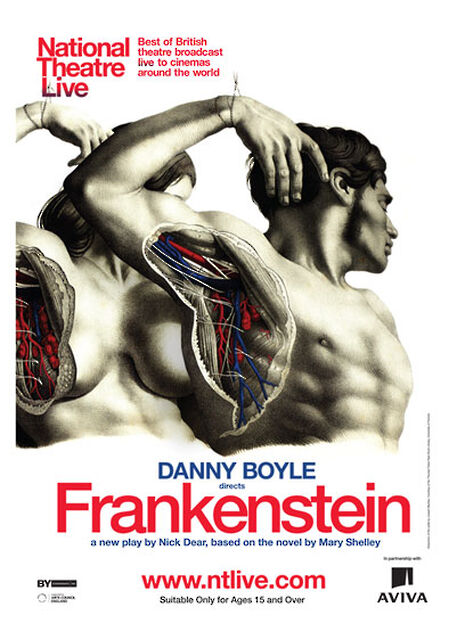The Cost of ‘Cinecasting’
National Theatre Live broadcasts theatrical productions to screens around the world, as they are happening. Kate Abnett asks how its success will change the future of theatre

February this year saw the opening of Danny Boyle’s Frankenstein at the National Theatre. The production is the latest offering from National Theatre (NT) Live , an initiative that has been running since 2009, sending live broadcasts of London-based shows to cinemas and arts centres across the globe.
The concept is innovative, but not unique. The Bolshoi Ballet similarly transmits a ‘cineseries’ worldwide, and The Metropolitan Opera in New York began ‘cinecasting’ five years ago. Unsurprisingly, such ventures have proved popular. Like Twitter and YouTube, they push for the creation of a more interactive, shared experience of culture, mimicking the buzz of online discussion forums and live web-chats. In addition to the stage show, the intiative offers an insight into the process of theatrical production - while members of the ‘primary’ audience filter into their theatre seats, NT Live viewers are shown behind-the-scenes videos and interviews. In this way, the project might prove an invaluable means of breaking down the perceived wall of exclusivity around theatre and opera.
This season’s production of Frankenstein has sold out the National Theatre for the whole of its four-month run, but will also be broadcast to 375 venues. Its commercial success is not something to be taken lightly, especially in today’s economic climate - 206 UK theatre companies, galleries and arts venues are to lose their government grants in 2012. Though the NT Live initiative is supported by the British taxpayer, therefore, it seems fitting to invite the whole world to enjoy what it has created. Nevertheless, with small-scale theatre relying more than ever on ticket sales for revenue, NT Live's capacity to grab big audiences could pose a threat to the life of smaller institutions.
Indeed by providing theatre with blockbuster-sized audiences, NT Live amplifies fears that theatre is becoming ruled by celebrity. In 2008, Sir Jonathan Miller spoke out against a West End which he thought "intoxicated with celebrities and stars". His comment came after two of his extremely well received regional productions were rejected for performance in London, largely because he refused to replace the original cast with “more luminous names”. From Benedict Cumberbatch and Danny Boyle, to Jay-Z and Will Smith, NT Live productions have certainly boasted an array of well known artists. With thousands of seats to fill per performance, these big names might well become a common tool for sustaining commercial success.
Though a bold and successful venture, NT Live also makes a potentially damaging move towards centralised control of theatre’s artistic freedom. Projecting theatrical content onto the big screen exposes theatre to new kinds of evaluation - as with any film shown in a UK cinema, NT Live broadcasts are given an age restriction by the British Board of Film Classification. Frankenstein was rated 15+, a rating which might appear reasonable given that it contains a rape scene. This is an unusually high age restriction for theatre, however - compare Coram Boy (National Theatre, 2005), featuring a hanging, dead infants and a sex scene, rated 12+, or the infamous nudity of Daniel Radcliffe in 2007’s Equus, rated 8+. If controversial artistic decisions mean harsher age restrictions, directors might be tempted to tone down risky ideas in order to ensure their production reaches international audiences.
Martin Prendergast, Head of Corporate Development at the National Theatre, says of NT Live: “It’s not theatre, but it’s not cinema either, it’s something new.” It must indeed be treated as a new idea, for unless cinecasting is acknowledged as a new art form in its own right, it will continue to carve its funding out of other arts budgets. For the same reason, it also demands specifically designed criteria for its own censorship.
In some respects, projects like NT Live offer something better than either the cinema or the stage - audiences can simultaneously enjoy the close-up intimacy of a film and the raw beauty of live theatre. If categorised as being part of either medium, however, they threaten to compromise the autonomous artistry of both.
Cambridge Arts Picturehouse will be showing National Theatre Live's ‘Frankenstein’ on Sunday 15 May, and ‘The Cherry Orchard’ on Thursday 30 June
 News / Cambridge academics sign open letter criticising research funding changes22 February 2026
News / Cambridge academics sign open letter criticising research funding changes22 February 2026 News / University Council rescinds University Centre membership20 February 2026
News / University Council rescinds University Centre membership20 February 2026 News / Hundreds of Cambridge academics demand vote on fate of vet course20 February 2026
News / Hundreds of Cambridge academics demand vote on fate of vet course20 February 2026 News / Supporters protest potential vet school closure22 February 2026
News / Supporters protest potential vet school closure22 February 2026 News / Union cancels event with Sri Lankan politician after Tamil societies express ‘profound outrage’20 February 2026
News / Union cancels event with Sri Lankan politician after Tamil societies express ‘profound outrage’20 February 2026







